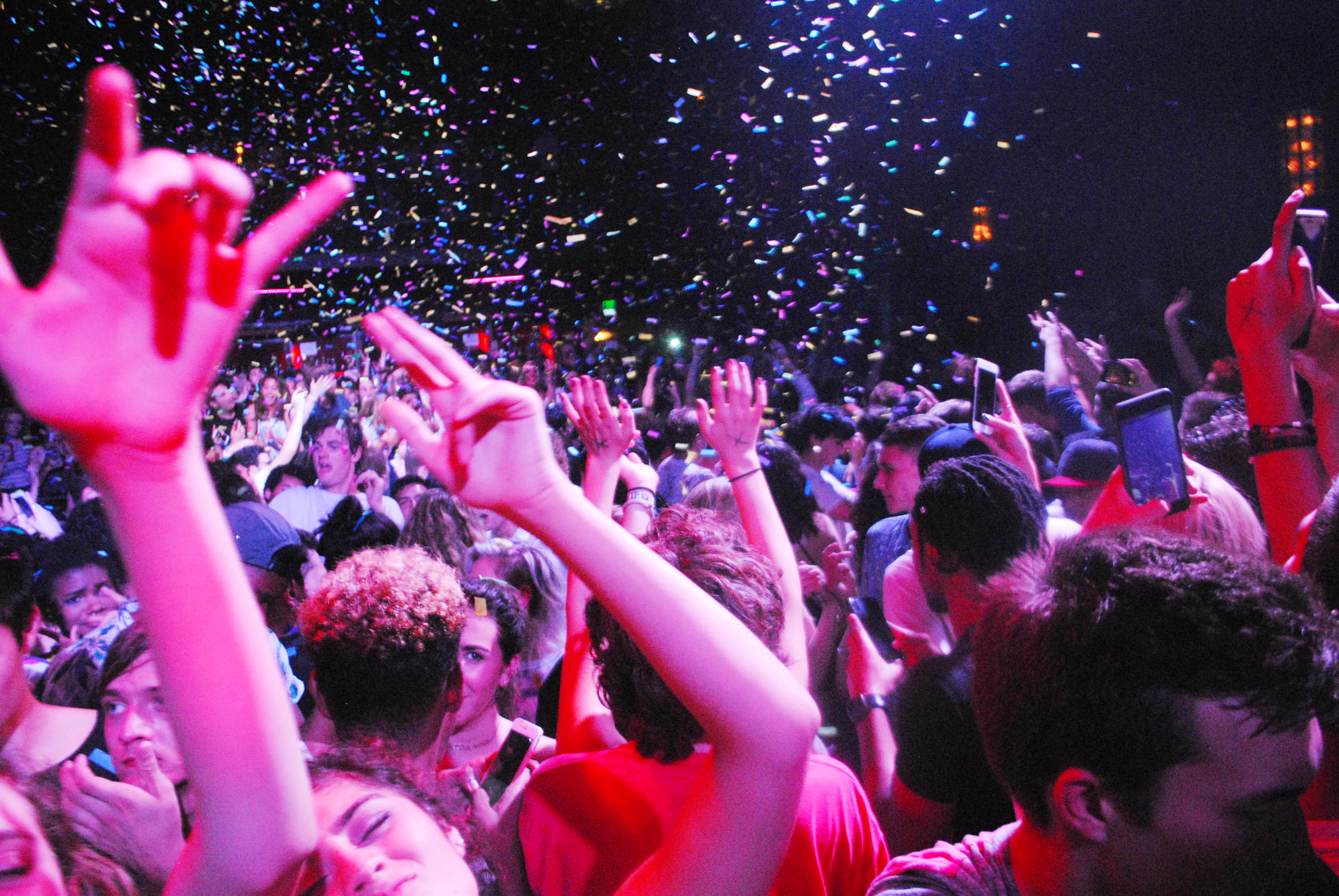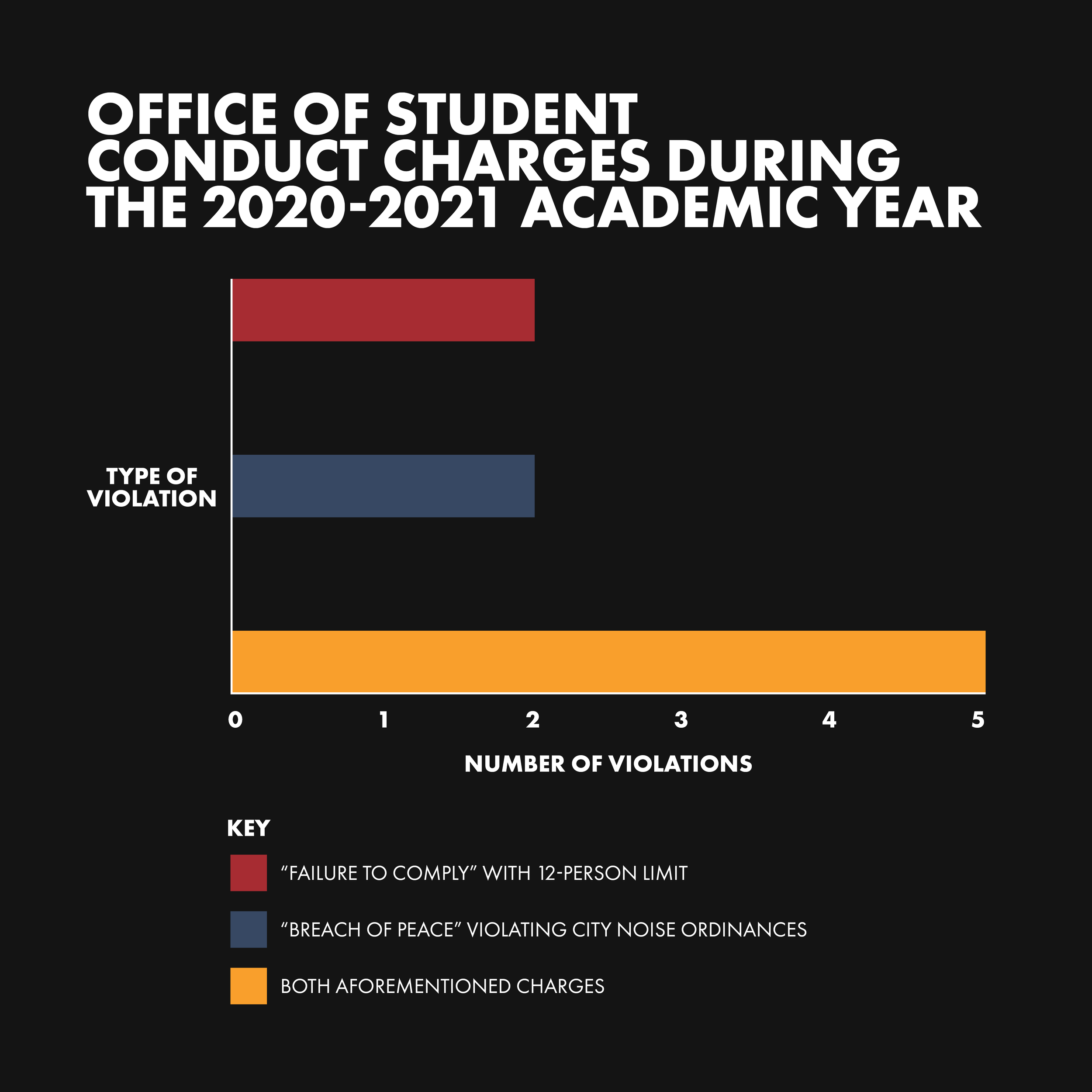Phi Delta Theta, Beta Theta Pi chapters suspended pending fraternity conduct investigations
Multiple fraternities are under fire for hosting parties that were shared online through two anonymous social media accounts, which have sparked a debate around cancel culture. Panther Archives
Update March 2, 10:48 a.m. PT: Videos and images circulating social media the week of Feb. 21 displayed hundreds of students at Chapman University drinking, spraying alcohol across crowded rooms and dancing in packed groups. While these activities are common pre-pandemic occurrences at fraternity parties, these actions directly violate the university’s and its Interfraternity Council’s (IFC) COVID-19 regulations: Social gatherings of 12 or more individuals are prohibited.
The creator of these guidelines? The very same fraternities in clear disregard of them.
“Those (policies) are voted in by the chapter delegates, and nobody on the IFC (executive board) has a vote on that,” said IFC President Mac Francini. “It certainly is peculiar that chapters would violate the rules they voted into place.”
Three fraternities — Phi Delta Theta, Beta Theta Pi and Phi Gamma Delta — are currently undergoing review via the Office of Student Conduct for evidence Francini regarded as “frightening.” A video that surfaced on Instagram shows multiple alcohol bottles being poured on pledges wearing white T-shirts, a possible act of hazing. Todd Simmons, director of Chapter Support for Phi Delta Theta’s general headquarters, told The Panther that the Chapman’s chapter was put on operational suspension Feb. 22 as they are actively investigating the in-person gathering.
The university itself has also suspended Phi Delta Theta and Beta Theta Pi’s new member program, pending investigations that address all three Greek life organizations and the individual students affiliated with them. This suspension restricts gathering as a new member class and all activity related to new member meetings or education programs. Colleen Wood, the director of the Office of Student Conduct, clarified with The Panther that Phi Gamma Delta’s investigation began prior to the dissemination of the social media posts.
“We’re drinking from the fire hose this week with reports from the students who are concerned about the posts,” Wood said. “I would encourage any member of an organization to be forthright and honest and transparent as possible. Not doing so isn’t helpful to our investigation, but I see in the long run, it isn’t really helpful to the organization either.”
Dean of Student Jerry Price confirmed that interim disciplinary actions have been imposed upon conduct violators while the investigations continue. However, Price clarified that although the university may release information about fraternity, sorority and other student organization repercussions, no information can be shared on individual student disciplining due to privacy law FERPA.
“Our objective isn’t to catch and punish people as much as it is to stop this behavior,” Price said. “But they’re still our students who we’re trying to educate, get them to grow up, be more responsible and graduate from college. That’s why I’m discouraged by these social media accounts that … create more animosity among the community.”
“Our objective isn’t to catch and punish people as much as it is to stop this behavior. But they’re still our students who we’re trying to educate, get them to grow up, be more responsible and graduate from college. That’s why I’m discouraged by these social media accounts that … create more animosity among the community.”
In the midst of this conflict, the evidence — disseminated online through anonymous Instagram accounts dubbed @chapmansuperspreaders and @chapman.party — has ignited a new debate centered around whether their social media posts represent modern-day activism or a product of “cancel culture.” A petition demands Chapman University hold its students accountable for partying, which has over 740 signatures as of Feb. 28. In a campus-wide email Feb. 24, Price acknowledged the justified feelings of frustration toward partying students, but called the accounts’ behavior “unhelpful” and “unhealthy.”
Students like Sofia Savage, a sophomore business administration and political science double major, agree with Price’s assessment.
“These accounts bother me because they’re encouraging people to rat each other out and are promoting cancel culture, which is already toxic in itself,” Savage said. “They are turning people against each other instead of creating a dialogue or respecting people’s autonomous decisions to disagree.”
Savage said the size of crowds in the videos exemplify a community desire to return to normal life. However, others like Jessica Almos, a junior environmental science and policy and theater studies double major, said partying during a pandemic only demonstrates the “privilege at Chapman” and a reckless disregard for others’ safety — especially when the campus is slated to reopen for hybrid classes this month.
Colleen Wood, the director of Student Conduct, provided The Panther with statistics on the office's charges since August 2020. Graphic by HARRY LADA, Art Director
Provost Glenn Pfeiffer confirmed with The Panther that no changes to the returning timeline will be made unless large gatherings continue to take place and an increase in COVID-19 case rates demonstrates a cause for concern. As of Feb. 28, Orange County remains in the “widespread” tier of the COVID-19 county watchlist, with a test positivity rate of 5.4%.
“They shouldn’t be pushing to go back on campus when the students are committing actions like this,” Almos said. “It’s so frustrating living in a country where we could’ve dealt with it in March. But, no — nobody stayed home, nobody listened and so here we are in our third semester online.”
Aided by people sending in screen-recorded material, the accounts have reposted videos shared to students’ own social media — such as Snapchat, TikTok or YouTube — of parties held over the past few months. The original account, @chapmansuperspreaders, has gained over 1,600 followers, with @chapman.party accumulating over 950 since both of the accounts were created Feb. 22. The owner of @chapman.party, who spoke to The Panther under the sustained condition of anonymity to avoid harassment, said holding students accountable remains their sole motivation.
“(We are) extremely tired of seeing the blatant disregard for human life,” the account wrote in an Instagram direct message to The Panther. “These students and organizations were not shy about posting their videos online, but had an issue with their videos being reposted. In our opinion, they are just sorry they were caught.”
“(We are) extremely tired of seeing the blatant disregard for human life. These students and organizations were not shy about posting their videos online, but had an issue with their videos being reposted. In our opinion, they are just sorry they were caught.”
The presidents of Phi Delta Theta, Beta Theta Pi and Phi Gamma Delta did not respond to The Panther’s requests for comment. Pi Kappa Alpha — who is under IFC investigation along with Phi Delta Theta and Beta Theta Pi — likewise did not return The Panther’s outreach.
The social media posts have directly tagged a number of students by name. First came Phi Delta Theta member Harry Raftus, who has amassed over 1 million followers on TikTok with videos of him drinking alcohol. Then came students Daniel Foldes, Hannah Battista, Sebastian de Arantes Oliveira and former Student Government Association (SGA) Senator Rithika Muthukali, who SGA announced resigned from her post. None of the aforementioned students responded to The Panther’s request for comment, but SGA President Philip Goodrich said he has already begun discussions with Price to determine future actions and policies to more strictly enforce COVID-19 regulations.
“We’re going to look into it, specifically hearing about repercussions for these types of gatherings and with organizations throwing them,” Goodrich said. “I don’t think we need to live in an environment of policing, but we need to at least live in an environment where we have care for fellow neighbors.”
Public Safety responded to multiple reports of parties Feb. 20, but Chief Randy Burba said none were larger than 12 to 15 people. The Orange Police Department also responded to six separate Chapman University noise complaints that weekend. Sergeant Phil McMullin told The Panther that no gathering sizes were large enough to warrant a citation, but noted that it isn’t uncommon for crowds to disperse before police officers can arrive at the scene.
Thus, outside of the students’ social media accounts themselves, the main public evidence of parties comes from the Instagram accounts like @chapman.party. The account argued there would be no need for their content to be spread on social media if Chapman didn’t inadvertently encourage students to “make bad choices” by allegedly not holding them accountable.
“There has not been any statement released by students or organizations that have been caught,” the account wrote. “They are not apologetic for their actions and are extremely tone deaf for knowingly posting media content.”
The Dean of Student Office encourages students to submit concerns and report evidence of potential violations directly to the Chapman Office of Student Conduct via conduct@chapman.edu. To follow more on the story, Chapman News has also reported on the incident in their most recent show Feb. 26.


